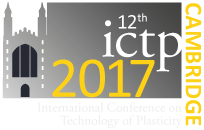 Professor Jianguo Lin, FREng, is a TATA Steel and Royal Academy of Engineering Research Chair and Head of Mechanics of Materials Division, Department of Mechanical Engineering, Imperial College London, UK. Professor Lin's research expertise is in Materials and process modelling, Solid/Computational Mechanics, and their applications in advanced plasticity manufacturing technologies.
Professor Jianguo Lin, FREng, is a TATA Steel and Royal Academy of Engineering Research Chair and Head of Mechanics of Materials Division, Department of Mechanical Engineering, Imperial College London, UK. Professor Lin's research expertise is in Materials and process modelling, Solid/Computational Mechanics, and their applications in advanced plasticity manufacturing technologies.
He joined Imperial College from the University of Birmingham in 2008 and established the Metal-forming and Materials Modelling Group at Imperial. The Group has developed a number of new processes for forming lightweight structural components. He is a Founder and the Director of Impression Technologies Ltd (a Spin-off company of Imperial College), which is resulted from one of their patented techniques on hot stamping of high strength aluminium alloys.
Abstract: HFQ®-Aluminium: Experimentation, modelling and application for stamping lightweight, complex-shaped, high strength panel structures
A novel forming technology, Heat treating, Forming and in-die Quenching (HFQ®), has been developed for producing lightweight, complex-shaped, high strength sheet metal components which, by enabling lighter weight structures to be used, will enhance the environmental friendliness of automobiles and land and air transport in general. By utilising the greater ductility of aluminium alloy at elevated temperature and retaining the ability to easily maximise mechanical properties of the formed heat treatable aluminium alloys, single-piece components can be used to replace currently used multi-part structures, such as aluminium alloy car door inner panels. Based on the patented HFQ® aluminium technology, a spin-off company, Impression Technologies Ltd (ITL), was formed with private investment for the commercialisation of the new forming technology. The world’s first HFQ® production line has been developed in partnership with AP&T (Sweden) and installed at ITL in 2016, shown in Fig. 1. The HFQ® technique has been used for the forming of high strength lightweight complex-shaped panel components for a wide range of vehicles in Europe. This presentation comprises a description of some of the scientific investigations undertaken in the development of this process including; novel alloy characterisation techniques, construction of novel computer-based material and process models and determination of process boundary conditions. Applications of HFQ® for automotive, aerospace and railway panel components are illustrated. Analysis has confirmed that using parts made by HFQ® technology could reduce body and chassis structures of passenger cars by 50%, resulting in a fuel saving of 20 to 25% and a reduction in CO2 of 28 to 35%.
